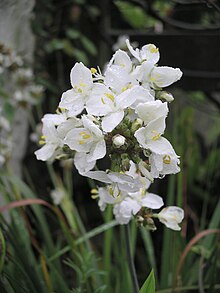Libertia grandiflora, the tukauki or mikoikoi, is a flowering plant in the family Iridaceae. The species is endemic to New Zealand, and is found on the North Island and the northern part of the South Island.[1][2] It is a clump-forming herbaceous perennial growing to 90 cm (35 in) tall by 60 cm (24 in) broad, with leathery linear leaves and panicles of white flowers in spring, followed by seed capsules.[3] The Latin grandiflora means large flowered;[4] its flowerheads can grow up to three centimetres across.[2]
| Libertia grandiflora | |
|---|---|

| |
| Scientific classification | |
| Kingdom: | Plantae |
| Clade: | Tracheophytes |
| Clade: | Angiosperms |
| Clade: | Monocots |
| Order: | Asparagales |
| Family: | Iridaceae |
| Genus: | Libertia |
| Species: | L. grandiflora
|
| Binomial name | |
| Libertia grandiflora | |
In cultivation this plant requires a sunny, sheltered location and protection from winter frosts. It has gained the Royal Horticultural Society's Award of Garden Merit.[5]
References
edit- ^ "L. grandiflora". Flora of New Zealand. Landcare Research.
- ^ a b Dawson, John; Lucas, Rob (2000). Nature Guide to the New Zealand Forest. ISBN 1 86962 055 0.
- ^ RHS A-Z encyclopedia of garden plants. United Kingdom: Dorling Kindersley. 2008. p. 1136. ISBN 978-1405332965.
- ^ Harrison, Lorraine (2012). RHS Latin for gardeners. United Kingdom: Mitchell Beazley. p. 224. ISBN 9781845337315.
- ^ "RHS Plant Selector - Libertia grandiflora". Retrieved 21 May 2013.